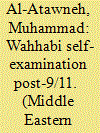| Srl | Item |
| 1 |
ID:
091006


|
|
|
|
|
| Publication |
2009.
|
| Summary/Abstract |
This article describes and explains the relationships between religion and government in contemporary Saudi Arabia. It discusses the extent to which religion is practically involved in politics and governance by examining the mechanisms of domination, the actual relationships between religious scholars ('ulama') and rulers (umara'), and the means by which authority is actually implemented. The current Saudi regime, I would suggest, is best described as a theo-monarchy, that draws power from longstanding religio-cultural norms. In this context, Wahhabi Islam seems to authorize a distinctive government paradigm, one not yet recognized by the relevant Islamic literature
|
|
|
|
|
|
|
|
|
|
|
|
|
|
|
|
| 2 |
ID:
102597


|
|
|
|
|
| Publication |
2011.
|
| Summary/Abstract |
Saudi Arabia found itself under an unflattering spotlight in the wake of the events of 9/11, perhaps more than any other country in the Middle East. The fact that 15 of the 19 suicide skyjackers were Saudi citizens provoked an avalanche of criticism in the West as well as in some parts of the Islamic and Arab world against Saudi religious beliefs, rulers, social customs, and school curricula. This article traces the Wahhabi Post-9/11 ideological "self-examination" of relationships with non-Wahhabis. Emphasis will be placed on the current Wahhabi perceptions of the fundamental terms of "other" and "otherness" that are most likely to affect relationships between the Wahhabis and other cultures and religious groups. I argue that post-9/11 Wahhabi Islam acknowledges the problematic nature of its traditional perception of the 'other' and, therefore, is making significant and unprecedented efforts to reformulate and redefine religious doctrines, such as jihad, tolerance, interfaith dialogue and so forth.
|
|
|
|
|
|
|
|
|
|
|
|
|
|
|
|